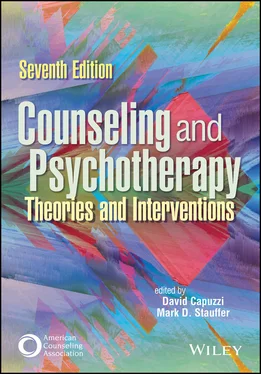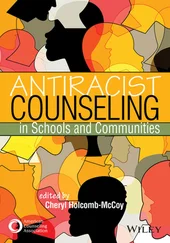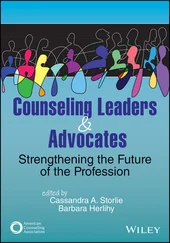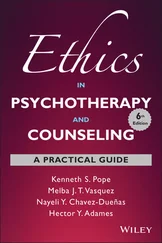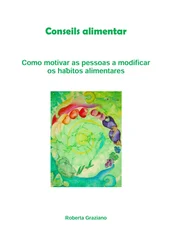Counseling and Psychotherapy
Здесь есть возможность читать онлайн «Counseling and Psychotherapy» — ознакомительный отрывок электронной книги совершенно бесплатно, а после прочтения отрывка купить полную версию. В некоторых случаях можно слушать аудио, скачать через торрент в формате fb2 и присутствует краткое содержание. Жанр: unrecognised, на английском языке. Описание произведения, (предисловие) а так же отзывы посетителей доступны на портале библиотеки ЛибКат.
- Название:Counseling and Psychotherapy
- Автор:
- Жанр:
- Год:неизвестен
- ISBN:нет данных
- Рейтинг книги:4 / 5. Голосов: 1
-
Избранное:Добавить в избранное
- Отзывы:
-
Ваша оценка:
- 80
- 1
- 2
- 3
- 4
- 5
Counseling and Psychotherapy: краткое содержание, описание и аннотация
Предлагаем к чтению аннотацию, описание, краткое содержание или предисловие (зависит от того, что написал сам автор книги «Counseling and Psychotherapy»). Если вы не нашли необходимую информацию о книге — напишите в комментариях, мы постараемся отыскать её.
Counseling and Psychotherapy — читать онлайн ознакомительный отрывок
Ниже представлен текст книги, разбитый по страницам. Система сохранения места последней прочитанной страницы, позволяет с удобством читать онлайн бесплатно книгу «Counseling and Psychotherapy», без необходимости каждый раз заново искать на чём Вы остановились. Поставьте закладку, и сможете в любой момент перейти на страницу, на которой закончили чтение.
Интервал:
Закладка:
Supporting Research
RCT in Varied Counseling Settings
As the counseling and related mental health professions move to support integrated, relational, multicultural, and trauma-informed approaches, researchers applied RCT to working with clients suffering from various traumas (Duffey & Haberstroh, 2020; Hitter et al., 2017; Jordan & Duffey, 2020; Kress et al., 2018). When we conceptualized trauma work in the book Introduction to Crisis and Trauma Counseling (Duffey & Haberstroh, 2020), we invited scholars and practitioners to frame crisis and trauma counseling using RCT as a foundational way to conceptualize the counseling relationship while integrating trauma-informed and trauma-specific practices. A counselor’s relational presence during times of crisis and trauma can help clients experience safety and rework traumatic disconnections. Bessel van der Kolk (2014) reiterated that a counselor’s attuned presence in trauma counseling is the most important factor in trauma recovery. Likewise, Kress et al. (2018) concluded that
relational-cultural theorists posit that isolation from others is a primary source of emotional suffering, [and] social withdrawal can prolong and compound trauma survivors’ emotional pain. RCT provides a nonpathologizing and culturally sensitive framework for counselors to use with clients who have traumatic stress disorders. (p. 111)
Given the damaging effects that arise from interpersonal, historical, and cultural traumas, RCT counselors provide the foundational relational attunement when working with people who have suffered various traumas. Other researchers integrated RCT with traditional counseling approaches, including reality therapy (Haskins & Appling, 2017), addictions counseling (Vandermause et al., 2018), career counseling (Storlie et al., 2017), college counseling (Crumb & Haskins, 2017; Lenz et al., 2016), group work (B. Hall et al., 2018), school counseling (Tuttle & Haskins, 2017), and supervision theory (Duffey & Haberstroh, 2014).
RCT and Developmental Relational Counseling and Supervision
Developmental relational counseling (DRC) is an integrative model designed to help people move from inaccurate and unproductive perspectives to perspectives that are more compassionate and realistic (Duffey & Haberstroh, 2014). On one hand, the unproductive and disconnecting perspectives people adopt about themselves and others can be seen as being self-aggrandizing and diminishing of others. On the other hand, people can disconnect from themselves and others when they adopt a self-denigrating perspective, whereby they neglect their own relational power.
Based in RCT and influenced by the enneagram personality typology, cognitive theories, and narrative theories, DRC provides a framework by which people can assess their degree of accurate self- and other-awareness, their connection to a range of perspectives that influence how they see themselves and others, and their appropriate or inappropriate use of power. (Duffey et al., 2020, p. 462)
Using a visual representation (Duffey et al., 2020), counselors work with clients to identify their connections to self-aggrandizing, self-denigrating, or clear and balanced perspectives within the varied contexts of their lives. Because DRC is RCT based, counselors explore relational images, strategies of survival, and how a client’s worldview disconnects them from meaningful relationships and mutuality (Duffey et al., 2020).
Using DRC as a framework, we designed a randomized study (Duffey et al., 2016) to evaluate the effects of supervisors who operated from self-denigrating, self-aggrandizing, and clear and balanced perspectives. Using the Relational Health Indices (Liang et al., 2002) as an outcome measure, clients rated the supervisory relationship as highly ineffective when supervisors acted in a self-aggrandizing or self-denigrating manner. The data demonstrated that counseling supervisees attended to the quality of the supervision relationship and appreciated supervisors who were clear and balanced and who relationally connected with supervisees.
Limitations
Unlike manualized treatments, RCT is a counseling theory and worldview about clients’ and counselors’ relational worlds, power in social contexts, and nuanced interpersonal connections. Although the BRCTM showed great promise for guidelines and counseling processes that followed RCT principles, there is a need for more outcome and comparative studies to evaluate the effectiveness of RCT-based interventions. Nevertheless, research undoubtedly shows that the counseling relationship, creative adaptations of evidence-based practices, and counselor relational abilities are the most robust predictors of client change (Wampold, 2015). With this in mind, RCT provides a road map for effective relationships that honor and respect clients from diverse backgrounds.
THE CASE OF CLARITA: AN RCT APPROACH
From an RCT perspective, we can see how Clarita has historically thrived in her relationships and at work. She has been a leader within her family and a role model for others in her hometown. Her parents trusted her with the care of her siblings when she was an adolescent, and she felt successful in her life. Attending college and branching out into a new cultural context away from Puerto Rico was exciting for her, and she married a man outside her social context, which was disappointing to those around her. And yet Clarita forged forward, moving back to Puerto Rico and cocreating a life with her husband and children. Unfortunately, she experienced abuse in her marriage and ultimately divorced. She carries full responsibility for caring for her two children and feels lacking in energy or support. She does have friends, which is important, although she often distances from them and feels depressed. Afraid of entering into new romantic relationships, her nocturnal dreams are debilitating, and she is exhausted. She feels responsible for ruining her life and the lives of others. Clarita is clearly experiencing what RCT would describe as condemned isolation .
Goal 1: Fostering Authenticity and Vulnerability
Clarita is a member of at least two marginalized groups—being a woman and being Puerto Rican. One could also include being divorced as a third marginalized group, particularly within the context of her family and early religious affiliation. Using an RCT framework, a counselor would begin work with Clarita by bringing the counselor’s authenticity and supporting Clarita’s apparent vulnerability.
Goal 2: Recognizing and Conceptualizing Relational and Controlling Images Through Mutual Empathy
It would be important for the counselor to consider Clarita’s cultural contexts and the ways these affect her now. When she married, Clarita’s Puerto Rican roots merged with her husband’s southern culture. In counseling, Clarita could explore the intersection of these two cultures and any associated controlling images she carried. From the case description, it seems that Clarita feels she is not good enough in many areas. Being aware of any controlling images and recognizing the ways these operate in her life could give voice to Clarita’s struggles with self-worth and sense of alienation.
The counselor would recognize the impact of Clarita’s disconnections and controlling and relational images, and the counselor would open up to experiencing Clarita’s pain. As they work together, they would explore the relationships in Clarita’s life and the sense of powerlessness that Clarita currently feels. The counselor would open themself to Clarita’s story and communicate that impact to her. This foundational expression of mutual empathy begins the process of Clarita’s grief work and the reworking of her relational and controlling images. It would also support the necessary work of increasing self-empathy and self-compassion.
Читать дальшеИнтервал:
Закладка:
Похожие книги на «Counseling and Psychotherapy»
Представляем Вашему вниманию похожие книги на «Counseling and Psychotherapy» списком для выбора. Мы отобрали схожую по названию и смыслу литературу в надежде предоставить читателям больше вариантов отыскать новые, интересные, ещё непрочитанные произведения.
Обсуждение, отзывы о книге «Counseling and Psychotherapy» и просто собственные мнения читателей. Оставьте ваши комментарии, напишите, что Вы думаете о произведении, его смысле или главных героях. Укажите что конкретно понравилось, а что нет, и почему Вы так считаете.
